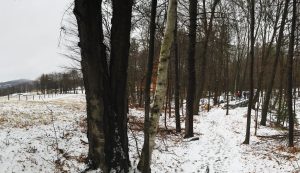‘Writing Words, Building Stories’: Finding Inspiration at MacLeish
Campus Life

Published February 9, 2017 (UPDATED: March 8, 2019)
On a cold and cloudy afternoon in January, half a dozen Smithies settled into window seats in the Bechtel Environmental Classroom, laptops at the ready.
The blond wood floors gleamed in the wintry daylight. Outside, the view stretched across a snowy hillside. The room was quiet enough to hear the gentle “tib, tib” of fingers on keyboards.
If ever there was a “room of one’s own” to motivate writing, it’s the classroom at Smith’s MacLeish Field Station in West Whately, Mass. For three days over Interterm, students in “Writing Words, Building Stories” transformed the field station into what Anna McLane ’17 called a “writing-specific place.”
McLane said MacLeish provided the environment she needed to pick up the threads of a novel she’s been working on since high school.
“I loved that the field station felt cut off and quiet,” McLane said. “There’s nothing like being alone with some tea, a project and some cozy silence.”

Photo by Zoe Kriegler-Wenk ’18
Zoe Kriegler-Wenk ’18 said she enjoyed being alone with her thoughts while also being in the company of other writers.
“We were there to write, and everyone around us was there to do the same thing in this beautiful, inspirational space,” said Kriegler-Wenk, who began writing a new play during the Interterm class. “I only wish we had more time each day to really sink into the experience of being there.”
Read a sample of the writing Kriegler-Wenk did in class below.
Class instructor Naila Moreira said she chose the field station in hopes that students would respond to the peaceful landscape and the eco-friendly design of the Bechtel Classroom.
“I personally do a lot of nature writing,” says Moreira, a poet, essayist and journalist who is a writing instructor at Smith’s Jacobson Center for Writing, Teaching and Learning. “I thought students in the Interterm class would find the setting inspiring too.”
Each “Writing Words” class began with a brief discussion of individual writing plans, followed by a period of independent writing. Toward the end of each session, students gathered to share their progress and, if they chose, read aloud from their work.
On this particular afternoon, Sadie Britton ’20 reported that she spent the time writing poetry, “which is funny for me because I usually don’t write poems. I took an album I liked and wrote poems around the songs.”
McLane said she had devoted the writing period to the challenge of revising her previous work.
“That can be a thorny place,” Moreira responded. “That’s when it really helps to have readers for your work. Having a group of those people from among other writers you admire can be really helpful.”
McLane took that advice to heart. She recently asked a close friend to read her novel and is hoping the resulting feedback will help her decide whether to try to get her work published or “let it go.”
After class, as they trooped back to the van to return to campus, students in the Interterm class stopped to take cell phone pictures of the wooded landscape and absorb some final moments of quiet.
Kriegler-Wenk said she found herself looking forward to the journey from Smith to the field station each day.
“It allowed us to enter a new physical space and leave behind all of the distractions of campus life,” she said.
Fiction by Zoe Kriegler-Wenk '18
“When it rained, you felt it from all sides. The persistent patter of droplets on the hatch above and the soft push and pull of the water beneath the hull. The room was a cocoon of sorts, tethered to the rest of the world only by a few fraying ropes. When she was a small child she would often wake up and wonder if the boat itself hadn’t floated away in the night to some new and fantastical shore.
She had been about twelve and in throws of a particularly dramatic middle-school diary entry when the thought of peeking out of her cocoon during the magic time had first occurred to her—her pen stopped short by that familiar pang of lonely tween romanticism.
She was convinced that if she could just escape into the night at that particular moment, someone would be waiting for her in the raindrop-blurred spotlight at the end of the dock. She knew about sneaking out less from personal experience and more by way of general association. After all, it happened in the movies all the time.
There was a hatch directly above her bed, the bolts not hard to loosen. She could pull herself out onto the deck, pause for a gloriously triumphant Titanic-themed moment on the bow of the boat before soundlessly leaping from the deck onto the dock below with unparalleled strength and grace. And then she would be off. Into the arms of a romantic stranger who would dance her through the dream hours and get her home just in time to slip back into bed before reality and her father woke her with the clattering of breakfast dishes in the small kitchen just outside her bedroom door.”
Anna McLane ’17 does some independent writing during an Interterm class at Smith's MacLeish Field Station.